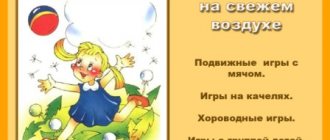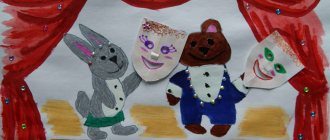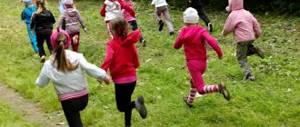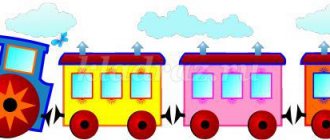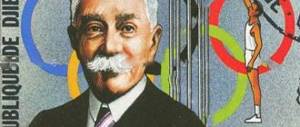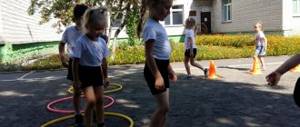I love you, Russia!
Patriotism is love for the Motherland. So in the simplest form we can characterize this complex, multifaceted concept. Why is patriotism a feeling that should be needed not only by the leaders of the country, but also by all its citizens, adults and children? Because only that person can be considered a truly harmonious person who feels involved in the events of the past and responsible for the present and future of his country.
How can we explain to children brought up on overseas games and films what love for the Motherland is for? In this difficult matter, a special role is assigned to patriotic games for children, which teach the most important civic and human values in an interesting and unobtrusive form.
Children's folk outdoor games as a means of patriotic education
Bibliographic description:
Raskatova, K. V. Children's folk outdoor games as a means of patriotic education / K. V. Raskatova, I. Yu. Kulko. — Text: immediate // Current tasks of pedagogy: materials of the VII International. scientific conf. (Chita, April 2020). — Chita: Young Scientist Publishing House, 2020. — pp. 56-58. — URL: https://moluch.ru/conf/ped/archive/189/10220/ (access date: 10.10.2020).
Give children more and more general, human, world content, but mainly try to introduce them to this through native and national phenomena...
V. Belinsky
Patriotism is a feeling of love for the Motherland, the Fatherland, the place where you were born, grew up and realized yourself as an individual. Recently, there has been a rethinking of the essence of patriotic education, its place and role in public life.
Research in the field of preschool pedagogy and psychology indicates that it is in preschool age that the basic foundations of personality are laid, the process of formation and formation of sociocultural experience begins, and a person “takes shape.” The education of patriotic feelings at the present stage of development of society obliges preschool educational institutions to develop cognitive interest, love for the Motherland, its historical and cultural heritage.
I work on patriotic education in all types of activities: educational, artistic and aesthetic, speech and play. In order for the knowledge acquired in the process of direct educational activities to be durable, it is necessary to constantly consolidate it in everyday life. And for this, like nothing else, a game is suitable, since it is known that it is the game that is the leading activity of preschoolers, and any, without exception, types of children's games are suitable for implementing the tasks of patriotic education: plot-role-playing, didactic, board-printed, finger, round dance, mobile.
After all, a folk game is our childhood, the fun of the older generation - our grandparents, a child’s practical reflection on the surrounding reality. After all, play is the activity through which children first begin to communicate with peers. The child begins to feel like a member of the team and learns to fairly evaluate the actions of his comrades. Moral qualities formed in the game influence the child’s behavior and character.
The game is a way of understanding the world around us. Through it, children get acquainted with animals, birds, their movements, sounds, and habitats.
For example, in such games as “Cat and Mouse”, “Owl”, “Blow on the Tail”, “Catch”, “Breeze”, “Hot Potato”, the life of the people is displayed. So, if a father or grandfather brought a bunny or a fox from the forest, then the tail of the prey served as fun for a small child. This is where such interesting games came from.
When explaining the rules of the game, I told the children that Russian folk games have a long history, they have been preserved and come down to the present day from ancient times, passed down from generation to generation, absorbing the best national traditions. I played various folk games with the children, but games such as “Colors”, “Burn, Burn Clear”, “Handkerchief”, “Ring”, “Geese - Geese”, “Blind Man’s Bluff”, became especially popular and favorite for them. “Cats and Mouse”, “Fisherman”, “Stream”, “Loaf”.
Using folk games in my practice of preschool education, I consolidate children’s knowledge about folk traditions. After all, folk games for children are valuable from a pedagogical point of view; they have a great influence on the education of the mind, character, will, develop moral feelings, physically strengthen the child, create a certain spiritual mood, and interest in folk art. They are quite diverse in their content, themes and organization.
The peculiarity of outdoor folk games is that they, having a moral basis, teach the developing personality social harmonization. Outdoor folk games teach the individual that it is not any personal achievement that has value, but one that is consistently integrated into the life of the children’s community.
The rules of the game have great educational significance. They determine the entire course of the game, regulate the actions and behavior of children, their relationships, and contribute to the formation of will. An outdoor game requires attention, endurance, intelligence and dexterity.
Children's acquaintance with folk outdoor games begins from early preschool age.
It is important to focus children’s attention on the folk game and instill a desire to play. To do this, I used simple games like: “Catch up with me”, “Grey Bunny”, “Bear the Bear in the Forest”, “Tag”, “Hide and Seek”, “Blind Man’s Bluff”, “Ali - Baba and the Breaking Chains” “Cucumber, Cucumber... " These games are built on the basis of children's experience, ideas, knowledge about the surrounding life, natural phenomena, lifestyle and habits of animals and birds. The main thing is that the game images are understandable and interesting to children.
During folk outdoor games, I attract the children’s attention to its content, monitor the accuracy of movements that must comply with the rules, the dosage of physical activity, give brief instructions, support and regulate the emotional - positive mood and relationships of the players, teach them to act deftly and quickly in the created game situation. At the end of the game, I pay attention to those children who showed courage, dexterity, endurance, and comradely mutual assistance. During the game, rhymes are pronounced together with the children, setting the necessary rhythm of the movements that are included in the game.
I offer children ways to choose a driver, with the concepts: barkers, counting cards, drawing lots, guessing. But in turn, not only do I suggest to the children what folk games we will play, but also the children, taking the initiative, talk about the games that their parents taught them to play. The children happily explain the rules of the game and play happily as a group. Tyshchenko Milana taught children to play the Russian folk game “Ducks and Geese.” The rules of the game are simple: children choose a leader, and the rest squat in a circle. The leader begins to walk slowly from the outside of the circle, touches each player with his hand and says the word “duck” or “goose”.
If the player is called a duck, he continues to sit quietly; if he is a goose, he jumps up and catches up with the leader before he manages to take the goose’s free place. If the leader succeeds, the “goose” leads the next round.
Through folk games, chants, exercises, and rhymes, I form in preschoolers the first feelings of patriotism: pride in their Motherland, love for their native land, respect for traditions. The knowledge gained will allow the child to understand the uniqueness of the culture of his people.
Outdoor folk games can be used during physical exercises, on walks, at leisure evenings, etc.
Such games have absorbed the best national traditions. They clearly reflect the way of life of people, their work, way of life, and national principles.
Folk games have a lot of humor, jokes, and enthusiasm, which makes them especially attractive to children. The accessibility and expressiveness of folk games activates the child’s mental work, contributes to the expansion of ideas about the world around him, and the development of mental processes. Folk games have everything: folklore text, music, dynamic action, and excitement, which greatly interests children. At the same time, they have strictly defined rules, and each player is accustomed to joint and coordinated actions, to respect the generally accepted conditions of the game. You can excel in such games if it does not violate the established order - this is the pedagogical value of folk games.
All work to introduce children to outdoor games takes place in close contact with the family. A parent meeting was held, “Time for Business, Time for Fun,” at which parents talked about their favorite folk games that they played in childhood and now taught to their children. Parents became active participants in the preparation of attributes for folk games, helped in the design of the photo exhibition “Favorite Games of Childhood,” and participated in the drawing competitions “Games Familiar to Us from Childhood.”
In the process of becoming familiar with folk outdoor games, students achieved the following results:
- They can play outdoor games independently.
- They use lots, counting rhymes, and riddles in active speech.
- They meaningfully and actively participate in Russian folk holidays.
- They independently choose a game that everyone plays together.
Children love to play. But for the game to help lay the foundations of moral education, we must play together - educators, parents, children. The game changes the real relationships between children and adults, it brings together, unites, thereby establishing friendly relationships and mutual understanding.
Thus, all of the above once again proves that the folk game is a reflection of the way of life, national traditions, and customs. This is part of folk pedagogy, which, based on the activity of the child, by all available means ensures the comprehensive development and familiarization of the child with the culture of his people. After all, having laid the foundation of morality from childhood, we can hope that we have raised a true patriot who loves his Motherland.
After all, folk games in combination with other educational means represent the basis of the initial stage of the formation of a harmoniously developed, active personality. They form the foundation for the development of his moral feelings, the creation and further manifestation of them in socially useful and creative activities.
In turn, we are not going to stop at the achieved results, as we are increasingly finding practical applications for them. In the future, I plan to expand and systematize children’s knowledge about folk outdoor games, consolidate and improve motor skills. I plan to continue to develop children's interest in the culture of their country and create an emotionally positive basis for the development of patriotic feelings. After all, folk games in combination with other educational means represent the basis for the initial stage of the formation of a harmoniously developed active personality, combining spiritual wealth, moral purity and physical perfection. While working with parents, I planned to involve them in joint leisure activities.
Literature:
- Wenger, L. A. Game as a type of activity. // Questions of psychology. 1996. No. 3;
- Karpova, S. N. Game and moral development of preschool children [Text] / S. N. Karpova, L. G. Lysak. - M.: Publishing house Moscow. University, 1986. - 142 p.
- Kasatkina, E. I. Game technologies in education and upbringing / E. I. Kasatkina // Preschool education. - 2009. - No. 12. - P. 17–19.
- Kasatkina, E. I. Game technologies in the educational process of preschool educational institutions. //Management of preschool educational institution. — 2012.- No. 5.
- Melnikova, N.V. The moral sphere of personality development of a preschooler. - Shadrinsk: ShGPI Publishing House, 2010. - 109 p.
Key terms
(automatically generated)
: game, child, folk game, patriotic education, rules of the game, knowledge of children, initial stage of formation, the world around us, vol.
Origins of patriotism
The education of patriotism in children begins at a very young age and continues at all stages of personality development. A home, a yard, close people and good neighbors, lilacs under the windows - these are the baby’s first impressions that will be remembered for the rest of his life, no matter where fate takes him.
Patriotic education of preschoolers and schoolchildren consists of several large blocks:
- studying the history of your country, its folklore and traditions, culture, achievements, studying the history of your small homeland: city, village, researching your ancestry;
- instilling respect for the defenders of the Motherland, for military exploits, awareness of one’s own civil and military duty;
- developing respect for the laws of your state and understanding the importance of their mandatory implementation;
- formation of a responsible and respectful attitude towards work and its results;
- nurturing love and respect for native nature, etc.
Playing and learning in kindergarten
Without games, it is impossible to imagine either the development or learning of a child. This is especially true at a younger age, when many personality traits are formed, including a caring and respectful attitude towards one’s native country and hometown. Parents and teachers should do their best to encourage the spark of interest in children, which can subsequently develop into sincere love and respect for their country. Competitions for crafts made from natural materials carefully collected in a park or autumn forest, drawing competitions on the theme “My City”, “My Russia”, preparation of stories about relatives who participated in hostilities and antiques kept at home - all this helps kids realize their belonging to a big country.
Patriotic events include active games and entertainment, relay races and competitions:
"Report from the Front"
For this relay race, children need to be divided into two or more groups, and a captain must be selected from each group. Each team is given an envelope with a report cut into pieces. This could be a puzzle with a picture or a simple word, for example, “Victory”. The captains are at the finish line. On command, the first participants run to the captain with one part of the dispatch, give it back and return to “theirs”, and the next participants carry the next part of the letter. Victory is awarded to the fastest team.
"Young Fighter Course"
A simple course for kids can be held in a spacious group or outdoors. Young defenders of the Motherland will have to walk through “swamp hummocks”, crawl through a tunnel, bypass enemy mines, climb a hill and look through binoculars. Obstacles are easy to make from available materials, and the winner is determined based on the time spent passing the lane by all participants.
Cultivating patriotism among schoolchildren
At school, a deeper study of the native history, literature, cultural and scientific achievements of Russia begins. Folklore performances, ancient folk games and amusements are relevant in primary school. They are not only exciting, but also help children learn a lot about their homeland. In middle and high schools, quizzes and intellectual competitions on the topic of native history and culture are widespread, allowing children to demonstrate their knowledge, as well as performances of excerpts from military literature and historical reconstructions. As a rule, they are timed to coincide with Defender of the Fatherland Day and Victory Day.
Many adults remember the legendary military-patriotic game “Zarnitsa”, which, albeit in a playful form, made it possible to feel the atmosphere of wartime and feel the feat of their country. Now games of this kind are being revived at the level of classes and schools. One of the alternatives to Zarnitsa is the Oath game, which can be played indoors, for example, in a school gym.
It includes 4 blocks:
- “Political training” - testing the knowledge of young soldiers about their native history, famous battles and military leaders;
- “Physical training” is a complex of sports competitions between the participants of the game;
- “Combat readiness” - competitions for knowledge of the theory and practice of combat;
- “Drill training” is a test of the ability to march.
Based on the results of the competition, the best fighters worthy of service in the armed forces are identified. The winners are awarded duffel bags with valuable prizes.
So, loyalty to one’s Fatherland is a noble feeling that must be cultivated from an early age. Games for children with patriotic content are a valuable element of the entire system of moral development of future worthy citizens of our society.
Patriotic games, the development of which took about 36 million rubles
It seems that our country has realized that our children are playing Western games, which often show Russians in a bad light. The Ministry of Defense decided to create patriotic games that would compete with Western counterparts and make the world think that Russia is not as bad as it is painted. 36 million rubles were allocated for these purposes. It’s already not bad, you can create Russian Black Ops and Battlefield . But we live in Russia, so I wouldn’t be surprised if about 20 thousand rubles were actually spent on all this. Because in the end we got four old elementary flash games that no one needed.
Although, of these four, only three can be called games: “ Mineweeper ”, “ Tetris ” and “ Battleship ” - and something tells me that we have already seen all this years ago. The latest application is called “ Military Rank Test ” and I don’t even know if anything needs to be explained about it.
The newsru resource even provides approximate costs for all these games. According to independent experts, the creation of each game can cost a maximum of 320 thousand, if people who really know their business are involved. Moreover, the development of each game only takes about a month and three people: a programmer, a flasher and an artist. In total, their monthly salary is about 250-300 thousand. Even if we take into account that each of them was bought a computer for development, 36 million does not work out here. Although part of the total amount, of course, was also spent on creating the portal, the amount is still greatly overestimated. It’s even scary to imagine how much money someone has ended up in their pockets. Probably, now somewhere on Rublyovka a new cottage has grown, or a security house attached to the cottage.
The same experts noted that for 30 million rubles you can make a really cool game with high-quality graphics and excellent gameplay. And here they give us old stuff with mediocre graphics. Maybe if you don’t know how much money was spent on it, you can play it, but keeping in your head the thought that it cost 36 million rubles, you just want to spit at the monitor.
The Ministry of Defense denies any criticism. And the head of the press service and information department, Igor Konashenkov, came up with a very interesting excuse: “... the created information portal of the military department is a completely new information platform with almost unlimited possibilities for further development and filling with multimedia content. It consists of dozens of thematic sections telling about various aspects of the activities of the Armed Forces and aimed at various age categories of Internet users.” This excuse is interesting because by the time you read it to the end, you will already have forgotten what it is even talking about. Or is it just me?
Now a little history. The idea to create domestic games, where you would have to play for Russians, and not for the bourgeoisie, was born back in 2010, after Sergei Sobyanin showed his dissatisfaction with the existing methods of instilling patriotism in citizens. It was proposed by State Secretary of the Ministry of Defense Nikolai Pankov.
A year later, Dmitry Medvedev came up with a proposal to create a domestic analogue of World of Warcraft. Two months later, in September 2011, the Ministry of Education and Science held a competition, following which the winner was awarded the right to develop a game engine for 90 million rubles. Oddly enough, no one showed any desire, and therefore no one was allowed to develop the engine.
Several years ago, the State Drug Control Service tried to create two games to promote a healthy lifestyle. They were called simply: “ Anti-drug addiction ” and “ Special forces fighter of the Federal Drug Control Service of Russia .” The result was downright horror, to put it mildly, but many recognized that this was progress in the right direction.
However, as you know, rely on the state, but don’t make a mistake yourself. Therefore, some developers have been releasing patriotic games themselves for a long time. Surely most have at least heard about the game “ Confrontation ,” for which Russobit-M even released the add-on “ Confrontation. Peace enforcement ". This game is still respected by gamers. You can also recall “ Cossacks ” from the Ukrainian GSC Game World and “ Operation “Bagration” ” from the Belarusian Gamstream.
As a result, we are once again convinced that the state is thinking more about how they can get more money somewhere and steal it into their pockets than about how to do things. Well, this is my personal opinion. You may think differently.
***
All the main news of the week in one video:
Free keys in and! Subscribe to our groups, read the news and get a freebie - Steam key for How to Survive
and other games! Find out how to get the game
